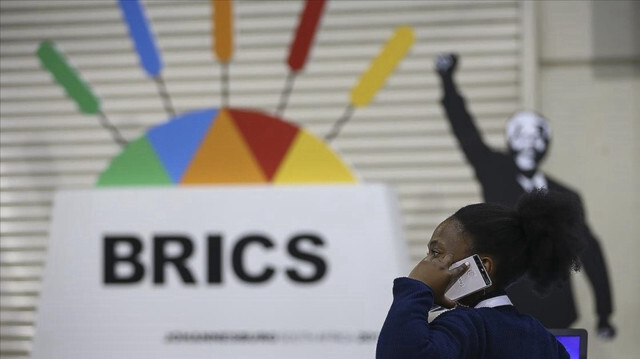
Summit in Johannesburg from Aug 22-24 to focus on new member admissions and bloc's common currency
The 15th BRICS summit in South Africa will kick off on Tuesday, with key discussions on new member admissions and a common currency expected to garner global attention over the three-day event.
The BRICS, an acronym for current members Brazil, Russia, India, China, and South Africa, stands out as a powerful platform with more than 40% of the world's population and over 30% of global GDP.
The summit will take place at the Sandton Convention Centre in Johannesburg, where significant steps regarding new member admissions and a common currency for the bloc are expected to be taken.
There are currently 22 official applications to join BRICS, including several Muslim countries, and if the common currency is implemented, it is expected to challenge the dominance of the US dollar in the future.
- BRICS
The primary objective of BRICS is to foster political, economic, and cultural cooperation among its member countries.
The bloc established in 2009 with Brazil, Russia, India, and China, took its final shape in 2010 with the inclusion of South Africa.
According to the BRICS Business Council report, member countries' combined GDP exceeds $56 trillion, accounting for 31.5% of global GDP, and is expected to reach 50% by 2030.
The bloc nations also control 18% of world trade and 22% of global foreign investments.
The current member countries cover 26.7% of the world's land area, with 3.2 billion people (41% of the global population).
- New Development Bank (NDB)
The New Development Bank (NDB), previously known as the BRICS Development Bank, was established in 2015 as a global alternative to the International Monetary Fund and the World Bank.
Based in Shanghai, China, the NDB began with a $100 billion capital and has since funded 98 projects totaling $32.4 billion, with an estimated benefit of 280 million people.
With the inclusion of Bangladesh, Egypt, the UAE, and Uruguay in 2021, the bank's membership reached nine. New members, such as Saudi Arabia and Algeria, are expected to join in the future.
- Summit likely to expand bloc membership
The BRICS group's appeal stems from its economic potential and role as a strong alternative to the Western-centric system, particularly among developing nations.
In July, South Africa announced 22 official applications and informal interest in joining the bloc.
Argentina, UAE, Bahrain, Bangladesh, Belarus, Algeria, Indonesia, Iran, Kazakhstan, Cuba, Egypt, Nigeria, Senegal, Saudi Arabia, Thailand, Tunisia, Uruguay, and Venezuela are among the official applicants.
All members, particularly China, are expected to welcome new applicants, as the historic expansion of the bloc takes center stage on the agenda at the Johannesburg summit.
- BRICS currency might challenge US dollar dominance
The summit's major agenda includes the "BRICS common currency," designed to rival the US dollar's dominance.
With the bloc’s economic might, the common currency aims to challenge the global prevalence of the US dollar.
China strongly supports the idea, whereas smaller economies like South Africa take a more cautious approach.
Transitioning to a common currency offers China advantages within BRICS and against the US, but for fragile economies like South Africa, it raises concerns about using a common currency rather than their national one.
- Putin to attend summit via video conference
Russian President Vladimir Putin will participate in the summit through video conference due to an arrest warrant issued by the International Criminal Court (ICC).
South Africa's obligation to arrest Putin as a member of the ICC has caused this issue to become a significant agenda item for the host country in recent months.
In response, the Kremlin announced that Russian Foreign Minister Sergey Lavrov would represent Putin at the summit.
The host country has also invited leaders from 53 African countries to the summit, which will be held under the theme "BRICS and Africa: Partnership for Mutual Accelerated Growth, Sustainable Development, and Inclusive Multilateralism."
- High security in Johannesburg
South Africa has beefed up security in Johannesburg ahead of the summit due to the country's high crime rate.
Police vehicles are stationed around hotels where foreign delegations stay.
The roads surrounding the Sandton Convention Centre, the summit venue, will be closed for normal traffic.

